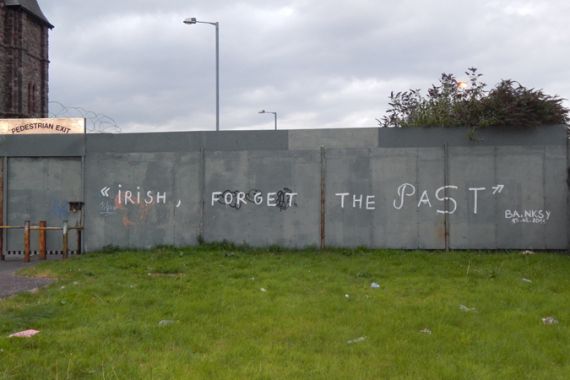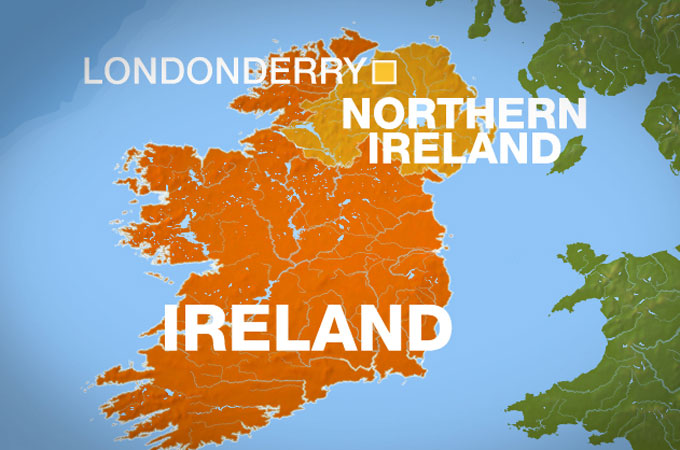‘The Troubles’ belie Northern Ireland success
Northern Ireland wounds from centuries of Catholic-Protestant violence continue to fester and overshadow its successes.

Belfast, Northern Ireland – Fifteen years after the Good Friday agreement aimed to bring peace to Northern Ireland, political tensions still run deep along religious lines in this United Kingdom territory.
“The Troubles”, as it was called during decades of conflict between mostly Protestant loyalists, who maintain devotion to the UK, and mostly Catholic nationalists who advocate for a reunited Ireland, ostensibly ended in 1998 with the Good Friday, or Belfast Agreement.
“To me, that’s the saddest thing, that we’ve confused politics with religion,” said David Duly, a youth counselor at a community centre in suburban Belfast. “It just so happens that many Catholics are nationalists, and many Protestants are loyalists, but the people who were planting bombs didn’t have a Christian bone in their body.” He asked the centre not be named for fear of reprisals.
Duly said the trauma of the Troubles has continued into the next generation. “Some of the youth have bigoted views, which they’ve gotten from their parents or their friends. It’s an ‘us against them’ mentality. If you ask them why they feel the way they do, they won’t be able to tell you.”
“Northern Ireland is such a small place that everyone’s been impacted by the Troubles, or know someone who was killed,” Duly said. “The Good Friday agreement was something where Republican terrorists and Loyalist terrorists, people who had murdered people, through the agreement were let out of jail free. And that is something that many people find hard to justify.”
‘Us against them’
There's a fear that looking at our history would turn us to violence, but it really could do the opposite.
That “us against them” mentality begins at an early age in Northern Ireland. According to the Northern Ireland Department of Education, only seven percent of all schoolchildren are in so-called “integrated schools”, in which Protestant, Catholic, and children of other faiths are educated together. The rest are in either Protestant-run or Catholic-run schools.
Kym Montgomery, owner of Little Joy Nannies, a company that pairs nannies with clients, said the reason for the fierce loyalty on either side comes from fear.
“Both sides feel the other doesn’t want them,” she said. “And so they cling as tightly as they can to Ireland, or to England, to prove that they belong.” Montgomery, who describes herself as a deeply spiritual woman, doesn’t identify as Catholic or Protestant, and said she sees such designations more as political affiliations than religious ones.
Duly blames a lack of comprehensive history instruction in school for contributing to the continuing tension. “There’s a fear that looking at our history would turn us to violence, but it really could do the opposite,” he said. “So many Catholics in Northern Ireland turned to Protestantism during the Reformation that many of the most hardened Protestants today have their roots in Catholicism, and don’t know it. People will walk down the street, holding up banners, talking about the importance of history, and they don’t even know their own.”
Those banners are most prominently on display during Northern Ireland’s marching season. While parades are held year-round on topics ranging from gay pride to funerals, the crux of the marching season runs from April to August, and celebrates Northern Ireland’s fiercely contested cultural heritage.
The most controversial parade is held each year on July 12, Orangemen’s Day, when Unionists celebrate the victory of the Protestant Prince William of Orange over the Catholic King James at the Battle of the Boyne in 1690. In 2013, the march erupted into a riot that was captured on social media the world over. In 2014, it passed without incident.
A new era?
People have benefited from the Good Friday agreement. They're not meeting armies as they're walking down the street.
These images of Northern Ireland, however, belie its successes. The country’s four major banks have recovered from the financial crisis. Despite the fiery photos, crime has reached a 15-year low in the city. International investors and major corporations are setting up shop.
“People have benefited from the Good Friday agreement,” said Dr John Hanvey, a Protestant and a former peacekeeper. “They’re not meeting armies as they’re walking down the street.”
“There’s less stress now, despite all the issues,” said Hanvey, who was awarded the Most Excellent Order of the British Empire (MBE) by Queen Elizabeth II for his work. “There are fewer explosions, although there are more than there should be. And I think a lot of attempted murders are being stopped at the moment, although that’s not necessarily due to the work of the police force.”
During the Troubles, Hanvey built community centres in conflict zones, including one in a home so repeatedly bombed it became uninhabitable. A mini-mart stands there now. It’s still in the Catholic section of Belfast, near one of the last so-called “peace walls,” with a gate that is still locked at night, dividing it from the Protestant section of town. Above the market flies the Irish flag in a country that more often than not flies the Union Jack.
Beckoning tourists
Northern Ireland has been striving to brand itself as a tourist destination, and in many ways, it’s succeeding. The city’s burgeoning food culture is less expensive to sample than in London or Dublin, the revitalised waterfront includes the newly opened Titanic museum, and fans of the television show Games of Thronesflock to the countryside to visit filming locations.
 |
Logistically, however, Northern Ireland remains a hard sell to tourists, especially those in the neighbouring republic. Although less than a two-hour bus or train from Dublin, it’s a different currency from Ireland, and for many international visitors, requires a separate visa.
A young volunteer suicide hotline worker attended Belfast pride on behalf of her Catholic charity, Samaritans, based in the Republic, and said many of her friends never come to Belfast.
“There’s an image that there’s all these terrorists running around loose,” she said. “And that’s simply not the case at all. I was really surprised at how clean and safe it was. But it’s too far from the south for a weekend, and if you have a proper holiday, why would you go to Northern Ireland?” She asked that her name be withheld because she wasn’t authorised to speak to the media.
While Northern Ireland’s southern neighbours may not venture up very often, the Republic of Ireland plays heavily in Hanvey’s vision for the future of peace in Northern Ireland.
“There’s a lot of stuff happening down south on a spiritual front, and that’s more likely to change our society than anything done by our government,” he said. “People are going to accept each other no matter where they come from, and people who are less accepting, are going to be accepted less.”